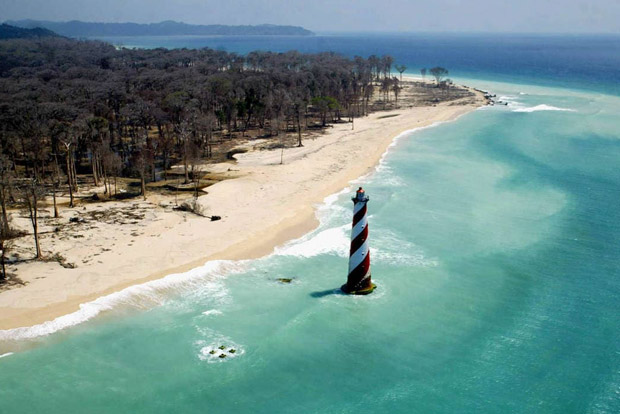Tread cautiously in Great Nicobar Islands
It argues that the project is essential to monitor and secure a critical maritime passage in terms of military strategy, and trade, humanitarian assistance and disaster relief operations.

Nicobar Islands
The Centre appears to be in a hurry to implement the mega infrastructure project in the ecologically sensitive and fragile Great Nicobar Island, brushing aside the concerns of a number of scientists, experts and civil society activists. The government’s plan has been met with legal challenges, and hearings are under way. The uncompromising legal defence that it has put up makes it evident that the Centre is adamant on implementing the plan.
The government’s justification for taking up the Rs 92,000-crore project comes from a national security perspective which few would question. It argues that the project is essential to monitor and secure a critical maritime passage in terms of military strategy, and trade, humanitarian assistance and disaster relief operations.
But serious objections relate to the economic growth logic proffered by the government, claiming that the logistics infrastructure would generate jobs and boost tourism. Critics say that it will be a threat to the environment and the dwindling population of the Scheduled Tribes and the Particularly Vulnerable Tribal Group (PVTG). The project, and the forces it will unleash subsequently, involve the destruction of forests and people’s culture and way of life. The government, in its defence, says that it is cognizant of the issues involved and that it will put in place a mitigation plan spread over three decades.
The central government appears to be overconfident where it should not be – like in matters relating to anthropological objections concerning PVTG. The crux of the matter is the conflict between preserving the unique culture and habitats of local people, and the pursuit of the government’s development goals. The question is whether the impact assessment studies have given due importance and weightage to the former. Critics say it was not done – partly intentionally and also out of lack of knowledge and expertise.
Regarding the threat to biodiversity, the government speaks of ambitious plans for the conservation of flora and fauna, besides the translocation of coral colonies. Scepticism arises from the government’s own track record in previous conservation projects linked to development projects or otherwise. The government, for instance, claims to have tested translocation of corals and achieved 90 per cent success rate, while the main criticism against translocation cites studies that show high failure rates and other scientific and ethical concerns.
The government needs to tread with caution and be wary of undertaking any project of gargantuan scale that could have “irreversible” implications. It is for the same reason, for instance, capital punishment is opposed. Secondly, when it involves PVTG, whose numbers are dwindling and whose culture is already under threat, it is better to adopt a more gradual and calibrated approach to initiating change that given agency and self-determination to indigenous people. Thirdly, the government appears to have short-circuited due process, which casts a long shadow on its own credibility and of its claims. Lastly, the frequent use of the national security card will be perceived as a ruse to stifle genuine criticism, and that does not reflect well on democratic governance.
The government should therefore take cognisance of the objections and re-evaluate and downsize the project, if it cannot totally abandon it. A solution acceptable to all stakeholders and addresses everyone’s concerns is possible if political one-upmanship is given up and a participatory democratic process is followed.



